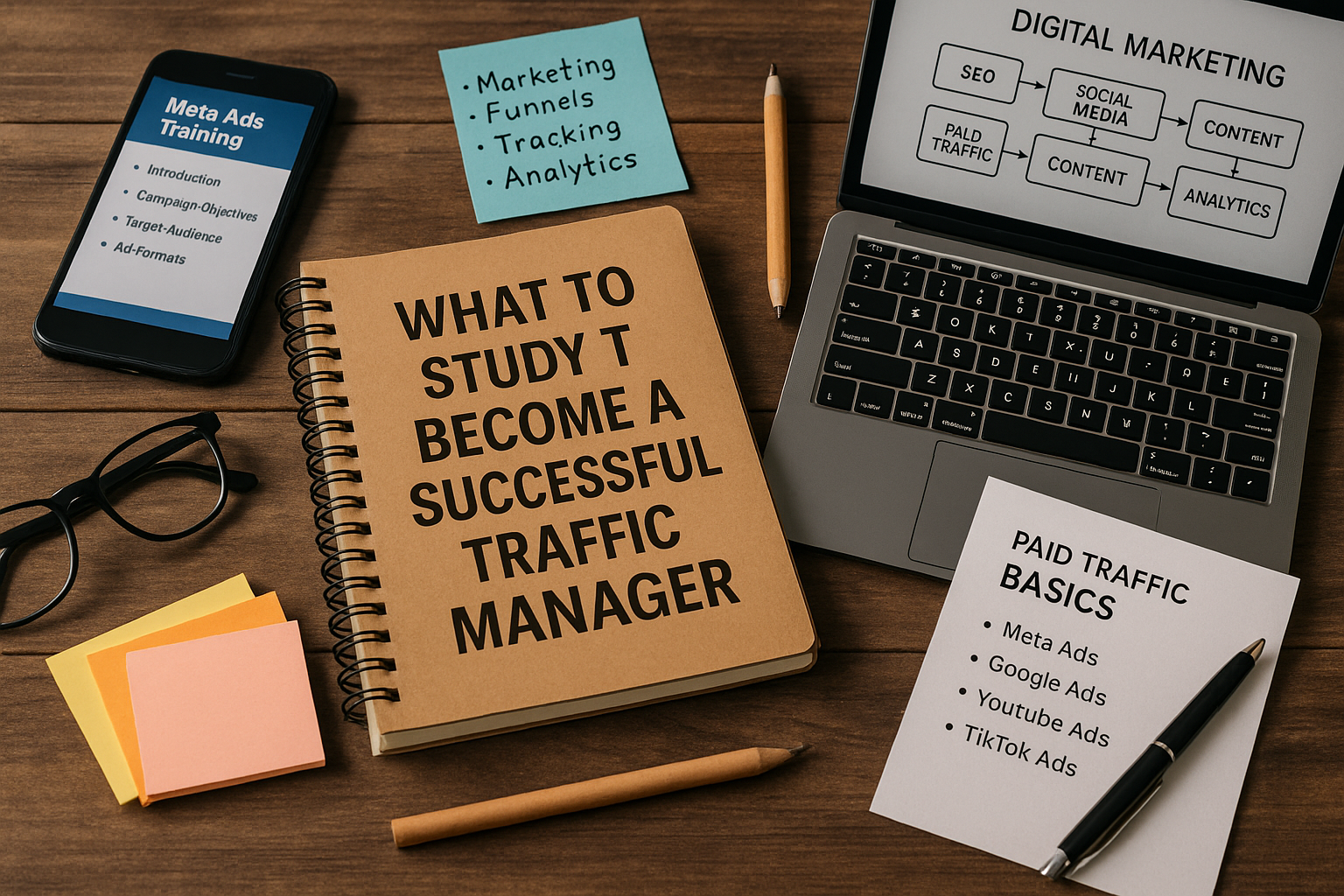If you’re starting a career in traffic management, one of the first questions that might come to mind is: “What should I study?” With so many platforms, tools, and skills involved, it’s easy to feel overwhelmed. But the truth is, you don’t need a university degree — you need practical skills and consistent learning.
In this guide, we’ll break down exactly what you should study to become a confident, effective, and in-demand traffic manager.
- Learn the Fundamentals of Digital Marketing
Before diving into ads, it’s essential to understand the bigger picture of digital marketing. This gives you context for how paid traffic fits into a broader strategy.
Key Topics to Study:
What is a marketing funnel
Customer journey stages (awareness, consideration, decision)
Lead generation vs. brand awareness
Conversion rate optimization
Basic sales psychology and persuasion
Free Resources:
Google Digital Garage
HubSpot Academy
Coursera – Introduction to Digital Marketing
- Master Paid Traffic Platforms
As a traffic manager, your core role is managing paid campaigns. Focus on learning the platforms most businesses use:
Start with:
Meta Ads (Facebook and Instagram)
Google Ads (Search and Display)
YouTube Ads
TikTok Ads (optional but growing fast)
What to Study on Each Platform:
Campaign types and objectives
How to structure ad sets
Targeting options (demographics, interests, custom audiences)
Ad formats and best practices
Budgeting and bidding
Reporting and performance metrics
Where to Learn:
Meta Blueprint (free)
Google Skillshop (free)
YouTube tutorials from trusted marketers
Paid courses on Udemy or Domestika
- Learn How to Use Tracking Tools
To optimize campaigns, you need to track user behavior. Study how to use:
Meta Pixel
Google Tag Manager
Google Analytics 4 (GA4)
UTM Parameters
Conversion APIs (Meta’s advanced tracking option)
These tools help you understand what’s working — and what’s not — so you can make data-driven decisions.
- Study Copywriting Basics
Every successful ad needs strong copy. Even if you’re not a professional writer, understanding copywriting can drastically improve your results.
What to Focus On:
Writing headlines that capture attention
Creating clear and persuasive calls to action
Structuring ad copy (Hook → Problem → Solution → CTA)
Emotional and benefit-driven language
Resources:
Copyhackers blog
The book “Copywriting Secrets” by Jim Edwards
Alex Cattoni’s YouTube channel
- Understand Funnel and Landing Page Design
Paid ads are just one part of the equation — users still need to convert once they click.
Study:
What makes a high-converting landing page
How to reduce bounce rates
Best practices for forms and CTAs
Funnel structures (Lead magnet → Thank you → Email sequence)
Use tools like:
Systeme.io
ClickFunnels
Carrd
WordPress with Elementor
- Develop Analytical Thinking
Being a great traffic manager is less about flashy visuals and more about data. You must become comfortable reading and interpreting:
Click-through rates (CTR)
Cost per result (CPR)
Return on ad spend (ROAS)
Conversion rates
Audience performance comparisons
Create a habit of asking:
Why did this campaign perform better?
What variables changed?
Should I scale, pause, or test something new?
- Stay Updated with Platform Changes
Ad platforms evolve constantly. Algorithms change, new ad formats launch, and tracking rules shift. That’s why continuous learning is key.
Stay Updated By:
Subscribing to Google Ads and Meta Ads newsletters
Following expert creators on YouTube, LinkedIn, and Twitter
Participating in marketing communities on Reddit or Discord
Reading blogs like AdEspresso, Neil Patel, or Search Engine Journal
- Optional But Powerful Skills
To stand out in a crowded market, you can also study:
Basic graphic design: Using Canva or Figma for ad creatives
Video editing: Using CapCut, InShot, or Adobe Premiere for Reels/TikToks
Email marketing: Using MailerLite or ConvertKit to follow up with leads
Sales: Knowing how to close clients as a freelancer or agency
Recommended Study Path (First 90 Days)
Here’s a simple plan to guide your studies:
Week Focus Area
1–2 Digital marketing foundations + funnels
3–4 Meta Ads basics + create a test campaign
5–6 Google Ads + Keyword research + Tag Manager
7–8 Landing pages + copywriting + creative testing
9–10 Analytics + tracking + reporting
11–12 Run small test projects or volunteer campaigns
Final Thoughts: Learn, Apply, Repeat
You don’t need to know everything to get started. What matters most is:
- Learning the right things
- Applying them in real campaigns
- Improving through feedback and data
The best traffic managers aren’t those with the most certifications — they’re the ones who consistently test, analyze, and adapt.
Start today, stay focused, and you’ll become a skilled professional faster than you think.
